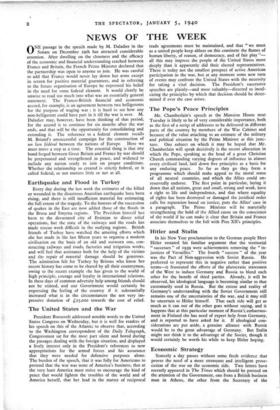The Pope's Peace Principles
Mr. Chamberlain's speech at the Mansion House next Tuesday is likely to be of very considerable importance, both as the first of a series of addresses to be delivered in different parts of the country by members of the War Cabinet and because of the value attaching to an estimate of the military and political situation by the Prime Minister at this junc- ture. One subject on which it may be hoped that Mr. Chamberlain will speak decisively is the recent allocution in which the Pope, speaking as the head of a great Christian Church commanding varying degrees of influence in almost every civilised land, laid down five principles as a basis for any enduring peace. So far as they go they form a programme which should make appeal to the moral sense of all neutral countries, and which the Allies could un- reservedly endorse. The first point in particular, laying it down that all nations, great and small, strong and weak, have a right to life and independence, and that where equality of rights has been destroyed or damaged the juridical order calls for reparation based on justice, puts the Allies' case in a paragraph. The Prime Minister will be materially strengthening the hold of the Allied cause on the conscience of the world if he can make it clear that Britain and France associate themselves to the full with Pius XII's principles.


































 Previous page
Previous page